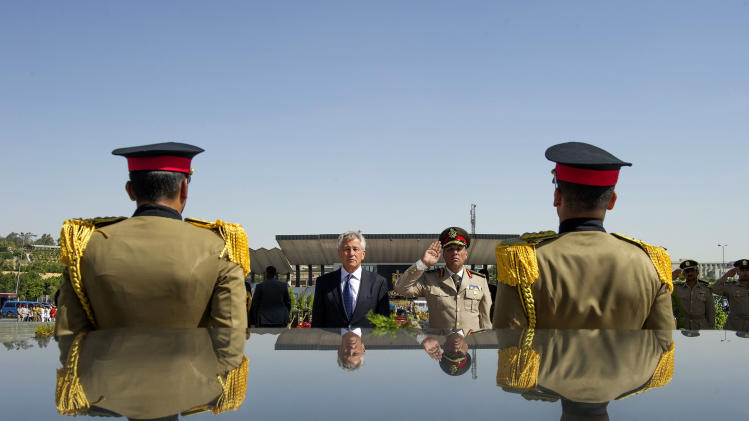
CAIRO (AP) — Egypt on Thursday
decried Washington's decision to freeze a sizable chunk of its annual
$1.5 billion aid to Egypt, saying the move was wrong and ill-timed.
In
Egypt's first public reaction, the Foreign Ministry said the American
move raised questions about Washington's commitment to supporting the
Arab nation's security goals at a time when it is facing terrorist
challenges, a reference to a burgeoning insurgency by Islamic militants,
some with al-Qaida links, in the strategic Sinai Peninsula as well as
scattered attacks in other parts of the country.The U.S. announced the freezing of millions of dollars in aid, most of it meant for the armed forces, as a show of displeasure over the military's ouster of President Mohammed Morsi and the subsequent crackdown on his Muslim Brotherhood and other Islamist allies. Washington said the aid would be restored if "credible progress" was made toward setting up an inclusive, democratically elected government.
In its statement, the Foreign Ministry said Cairo was keen to maintain good relations with Washington, but will independently decide its domestic policies. It also said Egypt will work to secure its "vital needs" on national security, a thinly veiled threat that it would shop elsewhere for arms and military hardware.
The suspension is likely to further hike anti-U.S. sentiment in Egypt, fueling a perception that Washington has sided with Morsi and his Brotherhood. The military ousted Morsi, Egypt's first freely elected president, on July 3 after massive protests by millions demanding his removal and accusing the Islamists of trying to dominate the country.
Since then, neither the military-backed civilian government nor the Brotherhood have shown any sign of compromise. Security forces have arrested more than 2,000 Brotherhood members, hundreds of Morsi supporters have been killed in police crackdowns on protests. Morsi himself will go on trial on Nov. 4 on charges he incited his followers to kill protesters during his year in office. The Islamists, in turn, have pushed ahead with protests demanding Morsi's reinstatement in office.
In its announcement Wednesday, the U.S. State Department did not provide a dollar amount of what was being withheld, most of it is linked to military aid, but officials in Washington said the aid being withheld included 10 Apache helicopters at a cost of more than $500 million, M1A1 tank kits and Harpoon anti-ship missiles.
The U.S. also is withholding $260 million in cash assistance to the government. The U.S. had already suspended the delivery of four F-16 fighter jets and canceled biennial U.S.-Egyptian military exercises.
The military gave no immediate comment on the U.S. move, news of which broke too late to be included in Thursday newspapers in Cairo.
One official said authorities were considering retaliatory actions against the United States, including possibly stripping U.S. warships from the preferential treatment in transiting the Suez Canal or curbing the use of the Egyptian air space by U.S. military aircraft.
The partial aid freeze could also boost military chief Abdel-Fattah el-Sissi, now the most powerful man in the country after he removed Morsi. He has not ruled out a presidential run next year. In a country where anti-U.S. sentiments run high, mostly over Washington's perceived bias in support of Israel, anyone seen to be standing up to the United States gains in popularity.
El-Sissi, a career, U.S.-trained infantry officer, said in an interview with the Al-Masry Al-Youm newspaper published Wednesday that Egypt would not tolerate pressure, "whether through actions or hints." He said Egypt's relations with the United States are "strategic" and founded on mutual interests.
Egyptian media has for weeks adopted an editorial policy that is mostly hostile to the United States, propagating the assumption that Washington was sad to see Morsi and his Muslim Brotherhood lose power and lambasting it for allegedly meddling in Cairo's affairs.
Former U.S. ambassador to Egypt Anne Patterson has been a primary target for the media's anti-U.S. campaign. She faced accusations of adopting a bias in favor of the Brotherhood and of trying to dissuade military chief Gen. Abdel-Fattah el-Sissi from removing Morsi.
"The popular mood does not seem to care" about the aid suspension, said Saad Eddin Ibrahim, a prominent Egyptian scholar who has a dual-Egyptian-U.S. nationality. "As a matter of fact most Egyptians who can speak out feel 'just as well, we would like to end this Catholic marriage with the U.S.,'" he told the Associated Press Television in an interview.
Cairo's close ties with the U.S. date back to the 1970s when Egypt became the first Arab nation to sign a peace treaty with Israel. The aid was supposedly Washington's reward for Egypt's commitment to peace after it fought four wars against Israel between 1948 and 1973.
Hosni
Mubarak, Egypt's toppled autocratic leader, jealously protected and
maintained that that close relationship from the time he took office in
1981 and for the next 29 years. One goal of the revolution that toppled
him was to end what many Egyptians see as Washington's undue influence
over Cairo's policies under Mubarak.









No comments:
Post a Comment